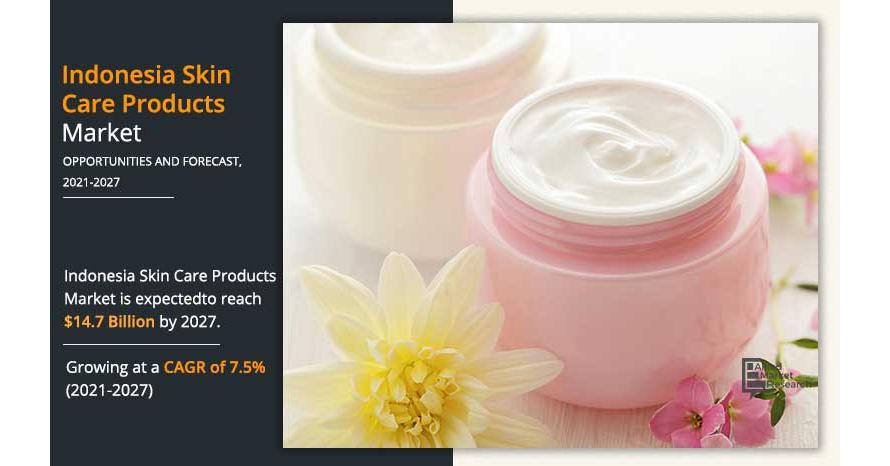(MENAFN- EIN Presswire)
Surge in Indonesia skin care products market demand for organic and natural ingredients in skin care products accelerated the market growth
PORTLAND, 5933 NE WIN SIVERS DRIVE, #205, OR 97220, UNITED STATE, September 26, 2022 / / — According to a new report published by Allied Market Research, titled,“ by Type, Age Group, Demographics and Sales Channel: Opportunity Analysis and Industry Forecast, 2018–2030,” The Indonesia skin care products market size was valued at $9,104.48 million in 2018, and is projected reach $18,828.24 million by 2030, registering a CAGR of 7.8% from 2021 to 2030.
In 2017, Indonesia recorded 25% rise in registration of local cosmetic companies, majorly the small- and medium-scale enterprises, owing to the government support for the growth of the Indonesia skin care products industry. Hence, currently the total industries are more then 76,095, which are small and medium enterprises. Furthermore, the government is focusing on this industry as evidenced in the President Direction (Indonesian: Perpres) No. 14 Year 2015 about National Development Core Planning Year 2015-2035 in which cosmetic and traditional medicine industries are becoming diversified national economic backbones. Despite various promotional and marketing efforts by domestic brands in years, global brands, be it locally manufactured or imported, still dominate skin care products sales in Indonesia. The superiority of such brands is difficult to break as skin care products have specific target customers and they tend to be loyal to a particular brand.
Request For Sample :-
They cannot easily switch to other products even if the competitors provide equal or better quality. The nation has 12–15% out of the entire population in the middle-to-high income range. These consumers, who predominantly reside in large cities, can afford to buy high-end imported products. For this specific group, quality, brand image, and being top-of-trends are among the major aspects considered while purchasing skin care products. Statistic wise, Indonesia has witnessed rapid growth of shopping malls over last 10 years. In the capital Jakarta alone, more than 100 shopping centers have been registered. More than 10% of them are intended for high-end or luxury imported products. This is anticipated to presents remunerative opportunities for European brands, which are regarded as expensive but come with top-notch quality, and are hence highly desirable. Rise in women population in the country coupled with higher inclination toward naturally derived skin care products are further anticipated to boost the Indonesia skin care products market opportunity during Indonesia skin care products market forecast period.
Halal regulations in particular have been providing new opportunities for the Indonesia skin care products market. Not only giving the local brand a competitive edge over global brands in the domestic market, Halal regulations further allow local based halal-certified cosmetic manufacturers establish their presence in overseas niche market too. For instance, the French cosmetics giant L’Oréal in Indonesia already has a halal-certified factory, which supplies the domestic market and the Southeast Asia region. Most of the products are sold under the Garnier brand, including facial cleansers to halal-approved skin lightening creams.
In addition, Kilala Tilaar, corporate director of creative and innovation from local beauty product giant Martha Tilaar Group believes that natural or organic beauty products drive the growth of country’s personal care and grooming industry. However, in the skincare market in Indonesia, multinational corporations with a local presence continue to dominate the industry with Unilever Indonesia, P&G Indonesia, and L’Oréal Indonesia leading the market competition.
Request For Customization :-
The Indonesia skin care products market is studied on the basis of product type, demographics, age group, and sales channel. Depending on product type, the market is categorized into face care, body care, eye care, lip care and others. By demographic, it is bifurcated into male and female. According to age group, it is fragmented into generation X, millennial, and generation Z. As per sales channel, it is classified into supermarket/hypermarket, specialty stores, department stores, beauty salons, pharma & drug stores, and online sales channel. By sales channel, the hypermarket/supermarket segment accounted for the maximum Indonesia skin care products market share in 2018.
The key players operating in the Indonesia skin care products market are the Beiersdorf AG, Estee Lauder Companies Inc., Groupe Rocher, L’Oréal Group, Procter and Gamble Company, PT Kino Indonesia Tbk, PT Mandom Indonesia Tbk, PT Martina Berto Tbk, PT Paragon Technology and Innovation and Unilever Indonesia.
Key findings of the study
By type, the face care segment dominated the market in 2018 and is likely to remain dominant during the forecast period.
By demographics, male segment is anticipated to fastest growing segment during the forecast period.
By age group, generation X segment dominated the market in 2018 and is likely to remain dominant during the forecast period.
Buy Now :-
TRENDING REPORTS :-
Allied Market Research
Allied Market Research
+ 1-800-792-5285
Visit us on social media:
MENAFN27092022003118003196ID1104929193
Legal Disclaimer:
MENAFN provides the information “as is” without warranty of any kind. We do not accept any responsibility or liability for the accuracy, content, images, videos, licenses, completeness, legality, or reliability of the information contained in this article. If you have any complaints or copyright issues related to this article, kindly contact the provider above.
